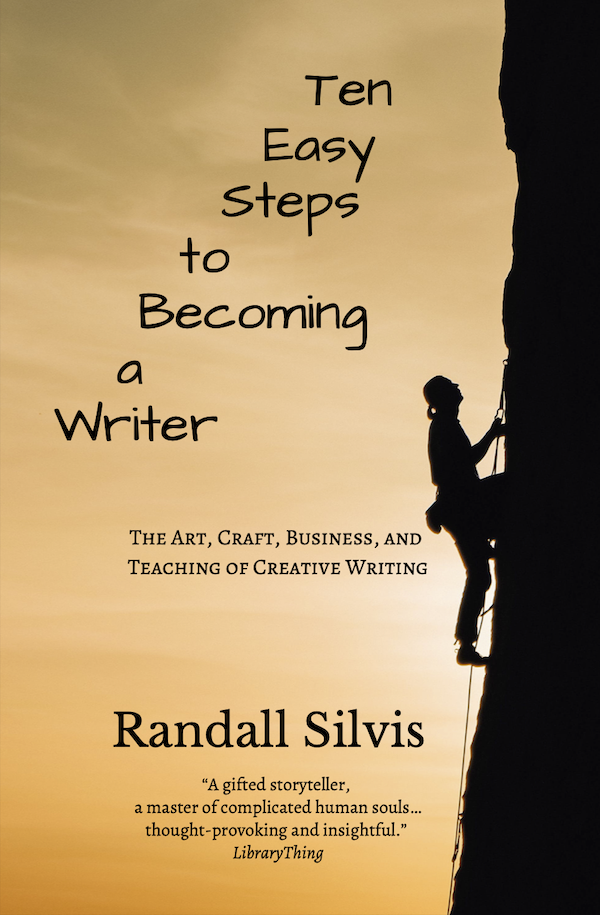 Photo by Alice Dietrich on Unsplash
Photo by Alice Dietrich on Unsplash
Today’s post is excerpted from Ten Easy Steps to Becoming a Writer by Randall Silvis.
I despise rules. Always have. Rules are for accountants and architects, assembly line workers and neurosurgeons. In order to be successful in those professions, there are procedures that must always be followed, variations that must never be employed. The word creative, however, as in the phrase creative writing, demands, at the very least, an imaginative interpretation of the rules.
Thanks to a degree of success over the years, I am asked again and again to lay out a prescription of rules for aspiring writers. This is one request I will not honor. No writer living or dead has discovered a universally foolproof method of churning out successful fiction, and none ever will. How can you discover what does not exist? If success as a writer depended upon nothing but following a list of rules, why are there so many aspiring writers who can’t get published?
The following are some of the so-called rules of writing fiction that I take a special delight in breaking. Creative writing is about possibilities, not about restrictions and limitations.
Never correct or rewrite until the whole thing is down.
In 1962, in a letter to a young writer, John Steinbeck added six tips for writing well. The above was one of those tips. Its error lies again, as all rules do, with its use of the absolute never. I frequently will not, because I cannot, begin a story or novel until I have crafted the perfect first paragraph. Of course there is no such thing as a perfect sentence, but the temporary confidence instilled by thinking that I have crafted one is what allows me to tackle a project that will consume my waking and sleeping hours for the next year or more. Stopping now and then to polish a faulty phrase or image is like taking another hit of confidence.
Five or six hits every morning keep me flying through the hours. But if I cannot fix a weakness within a minute or two, I will not allow my momentum to stall out with fretting and hand-wringing. Placing parentheses around the offending phrase, or highlighting the entire scene, will call my attention to it during the first rewrite.
I do not believe, as some practitioners apparently do, that a morning’s work is like a fast-moving stream through which one must dare not stop paddling, not even for a moment. Go ahead and stop if you want to. Pull ashore. Have lunch. Creep up as close as you can to that egret in the tree. Take a nap if you feel like it. In short, do whatever works for you. The imagination is resilient and flexible, and your routine should be too. But only if that works for you. I am most productive when I adhere, albeit loosely, to the discipline of beginning the morning with a bit of meditation, followed by four to six hours at my desk, followed by a good workout or hike. That’s my routine. It doesn’t have to be yours.
Write what you know.
In the days of Thoreau and earlier, when it was necessary to walk several miles to consult with someone more knowledgeable than you, Ernest Hemingway’s write what you know might have been sound advice. Hemingway also said that every writer needs a friend in every profession, someone whose expertise can be accessed—a statement that appears to contradict the earlier statement.
In order to do my research back in the 1970s and 80s, I had to visit a small-town library every week to order another load of books on interlibrary loan, which made the librarian my best friend. Today, a writer’s best friend is the internet.
I feel certain that Hemingway’s write what you know admonition was not intended to be an absolute. A clearer rendition of that advice would be to write what you know after you’ve done a ton of research and before you forget it all. And always remember that you are writing fiction. Fiction is stuff you make up. You can do that too. You can make stuff up.
Back at the turn of the millennium, I signed a contract, based on a single opening scene, to write two historical mysteries featuring Edgar Allan Poe for Thomas Dunne Books. I had never before written a historical novel and was not confident I could create a convincing New York City of 1840. In one scene it was necessary for me to get Poe across the East River in short order so that he could hotfoot it to Manhattan. I spent weeks trying to find a bridge he could cross or a ferry that would convey him in the allotted time. No such luck. I was stuck. I moaned about this impasse to a friend of mine who was also a writer, and he said, “It’s fiction, Silvis. Make up a bridge.”
Frequently it is the not knowing that brings a story alive, the writer’s desire to know what he does not, which then leads to the character’s discovery of what she did not know, and then the reader’s delight in participating in that discovery.
Show, don’t tell.
A favorite admonition among writing teachers all over the world. This admonition is only half false. The true part is that good fiction is built on dramatic scenes comprised of action, dialogue, description, and conflict—i.e. showing through visual and other sensory details and strong, active verbs. But a certain amount of telling is necessary too. Summary and exposition hold the scenes together. Telling bridges the time gap between scenes and between relevant beats. A little bit of telling, even if it’s something as simple as “Two weeks later,” opens nearly every new scene and every chapter.
So, once again, the problem with the rule is not that it is wholly false but that it is stated too rigidly. Summarization complements dramatization in every novel. In some, it shoulders the narrative load. Sebastian Barry’s Days Without End, for example, is a brilliant novel that is almost wholly told rather than shown.
In general, the more “literary” a novel is, the more it relies on reflection, speculation, and summaries of events. That is why a literary novel is so hard to adapt for the screen; so much of the momentum of the story is interior, taking place only in the characters’ heads.
Screenwriter Charlie Kaufman ran into this very problem when attempting to adapt Susan Orlean’s nonfiction The Orchid Thief for film. The problem was so infuriating that he finally seized upon introducing himself into the story as twins, one of whom was being driven mad by attempting to write the adaptation without sacrificing the book’s artistic integrity, and the other as a hack only too ready to pander to Hollywood’s lack of artistic integrity by changing the story willy-nilly. “Show, don’t tell” is fine advice if you are aiming for a quick sale of movie rights, or if you are fifteen years old and learning how to write in scenes, but the proper amendment of the phrase for the rest of us should be “show when you can, but tell whenever showing isn’t necessary.”
The writing life is mostly a lonely, miserable life.
A common refrain among self-pitying writers. This concept is a form of the romantic allure of the suffering artist. Trust me; there is nothing romantic about suffering. If you haven’t done much suffering yet, you will after you have children, and then you will understand how unromantic it is to be a miserable wretch who can’t stop worrying. In David Foster Wallace’s essay “The Nature of the Fun,” he addresses the reader as you and delineates for her the psyche-strangling process she will undergo from aspiring writer to acclaimed author, except at the beginning. “In the beginning,” he writes, “when you first start out trying to write fiction, the whole endeavor’s about fun. You don’t expect anybody else to read it. You’re writing almost wholly to get yourself off.”
I disagree. I expected all of my early stories to be published. (Only a few were.) Nearly every student I taught over a lifetime of teaching fully expected their early work to be published. So when Wallace says you don’t expect anybody else to read it, he’s speaking for himself.
Then comes success, Wallace says. What he should have said is, If you work very hard and are very lucky and talented, then comes success, depending on how you define success, because in most cases it is a very minor success resulting in few readers and little money.
After which, he says, “Things start to get complicated and confusing, not to mention scary. Now you feel like you’re writing for other people,” and the enjoyment you once found in writing “is offset by a terrible fear of rejection,” until you soon discover that “90 percent of the stuff you’re writing is motivated and informed by an overwhelming need to be liked. This results in shitty fiction.”
Eventually, he says, you might somehow shovel your way back to the fun of writing and discover that writing fiction is “a weird way to countenance yourself and to tell the truth instead of being a way to escape yourself or present yourself in a way you figure you will be maximally likable. This process is complicated and confusing and scary, and also hard work, but it turns out to be the best fun there is.”
Yeah, well, Mr. Wallace had himself some issues. It is a bleak journey he chronicles, no less so because it was one he was unable to see through to completion, which eventually led to his suicide. But it is not, despite the second-person address he employed, the journey you must take. It was his journey, the one he plotted for himself, but one tragically tainted by his need to be liked. There is absolutely no reason why any of that bleakness has to be part of your journey.
I have never thought of the writing life as fun or scary or complicated or as a way to be liked. It is sometimes easy, sometimes magical, sometimes maddening, demanding, and exhausting, yet frequently very satisfying. I do it principally for the magic and the mystery and the sense of satisfaction it can elicit. I love words and I love stories, and I take great pleasure from being able to indulge myself in those pleasures every single day. Storytelling is not a way to work out who I am or why I exist; being a father answered most of those questions for me.
Storytelling allows me to share my passion with others and to get paid for it.
David Foster Wallace was a fine but very troubled writer who confused what he was with what he did. This is a common affliction. Do not fall prey to it, because it usually won’t end pretty. If you don’t believe me, have a séance and ask Hemingway, Virginia Wolfe, Hunter Thompson, Sylvia Plath, and John Kennedy Toole.
No matter how authoritative and confident a writer sounds, and no matter how much you admire that writer’s work, he or she is capable of detailing only his or her truth, derived as it was from his or her own idiosyncratic journey. Your journey might be similar or it might be vastly different; it will never be exactly the same as any other writer’s journey.
Yet many writers, in an attempt to be helpful, create lists of rules for aspiring writers. The honest writers speak only in generalities: Write every day. Read voraciously. Write what you want to read. The less honest, or merely less humble, get specific and adamantine: Avoid all adverbs. Never start with the weather. Write short sentences. The more specific a writer’s rule, the less trustworthy it is, and the sooner you should find the nearest exit.
By all means go ahead and read the rules, if you wish. Give them a try. And if one of them works for you, use it until it stops working, then dump it in the trash heap with all the other useless rules that have been crammed down your throat since your first hour in daycare. Writing is creative, so don’t look to prescriptions or those who preach them. Sit down and create.
Stick with it, and you will figure out the rest along the way. That has always been and will always be the only true way to learn.
My favorite piece of writing advice comes from Margaret Atwood: Nobody is making you do this: you chose it, so don’t whine. That is the only rule you will ever need to post over your desk: Stop whining and write!










 Bengali (Bangladesh) ·
Bengali (Bangladesh) ·  English (United States) ·
English (United States) ·